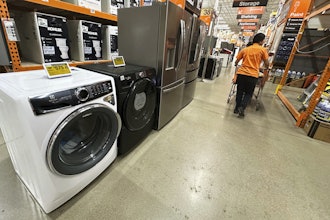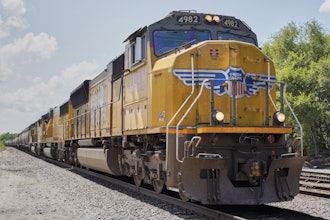In many ways, the supply chain has always existed as a fluid, evolving system. It has a long history, and is also a necessary component of our modern economy. Although it's easy for a supply chain manager to become accustomed to the nuances of the current supply chain, it's wise not to get comfortable — there are plenty of major disruptions ahead.
1. Blockchain
Cryptocurrencies like Bitcoin have been gaining much attention over the past few years, but interest in these alternative monies exploded in 2017. Although the initial excitement of cryptocurrency has waned a bit, supply chain managers are beginning to realize the value in blockchain technology within the modern supply chain.
With many blockchain testing programs wrapping up and entering their respective roll-out phases, supply chain managers will see a widespread shift toward blockchain-backed apps and systems in 2018.
IBM announced a new partnership with Maersk in January 2018, which will implement a blockchain-backed electronic shipping system on an international scale. The system has the potential to cut billions of dollars in annual spending on behalf of the global shipping industry.
A key selling point of blockchain is the indisputable record — complete with a timestamp — that lets all parties verify transactions. It's a highly efficient means of tracking nearly all forms of data — shipping information or otherwise — in the digital age.
2. Data Analytics
Data analytics play a major role in the modern supply chain. Real-time data processing and monitoring result in new tools for today's supply chain manager — but they have to know how to interpret them:
- Supply Assurance: One of the earliest and most impactful applications of real-time analytics is seen in supply assurance. Data analytics makes it easy to track production timelines and milestones, enforce safety and compliance standards, identify market patterns and more.
- Product Lifecycle Management: The field of data analytics also affects product lifecycle management. Risk mitigation, process optimization and competitive intelligence are made easier via next-gen analytics.
- Order Visibility: Like blockchain technology, data analytics are useful for tracking and verifying transactions, too. Sensor data is easily tracked to determine a shipment's exact location or even its current condition.
While the recent explosion of data is a boon for tech-savvy analysts, the amount of data makes it difficult to separate meaningful facts and statistics from useless or irrelevant information.
3. Transportation Automation
Transportation planners are on the frontlines of the latest supply chain disruption — and they're making significant progress in more ways than one. Although many think of autonomous vehicles when it comes to the next generation of transportation, supply chain managers have a myriad of applications for advanced robotics and automated systems:
- Smart Traffic Management: The city of Nanjing, China recently introduced a traffic flow management system that incorporates real-time data as well as predictive analytics and forecasts to help travelers plan their routes on a day-to-day basis. Such a system is easily extrapolated to the supply chain by providing information on traffic delays, detours and even weather conditions.
- Enhanced Safety Mechanisms: While some are concerned with the safety issues presented by autonomous and driverless vehicles, others focus on human drivers. New systems can estimate a driver's fatigue by monitoring various vital signs to help avoid accidents on the road.
- Aerial Drone Delivery: Remote-controlled aerial drones are already popular among consumers, so it makes sense that they're being considered for product deliveries and shipments. Amazon has already unveiled a proof-of-concept and demonstrated a potential delivery service — but limitations in current-gen technologies mean these drones are only viable for local shipments.
Most experts agree that we will see driverless and autonomous vehicles in the future — but we're not there yet. Until then, it's important to focus on one of the strongest aspects of the supply chain: the human workforce.
4. Workforce Technology
With growing concerns over increased automation and the potential for lost jobs, it's critical that supply chain managers work with their teammates to instill a sense of trust and job security.
It all starts with the initial recruitment phase. There is a proven strategy, a five-step process, which is incredibly helpful when it comes to finding and hiring the right candidates.
But recruitment is only one part of the process. It's also crucial to retain quality employees and offer promotions and advancements as warranted. Modern solutions in workforce technology fill all of these duties and more — but there are some obstacles to overcome before all of the benefits can be realized.
5. 3D Printing
It wasn't long ago when the current generation of 3D printers was seen as nothing more than niche products. The small size of the hardware, coupled with low quantities of raw materials, relegated these devices to custom products and small production runs.
But times are changing. GE already has a plan to 3D-print 40,000 jet fuel nozzles by 2020. They're so confident in the future of 3D printing that they've invested $1 billion into the technology in 2016 alone — and they're planning to invest another $1 billion over the next few years.
Other brands — from nearly every industry imaginable — are also exploring 3D printing. UPS is in the midst of launching more than 60 facilities across the U.S. to fulfill a new parts-on-demand printing service.
Accommodating the Evolving Supply Chain
Breakthroughs like this aren't just trying to disrupt the supply chain — they're looking to revolutionize it. From the impending embrace of blockchain technology to the industrialization of next-gen 3D printing, supply chain managers will have their hands full in the coming weeks, months and years.























